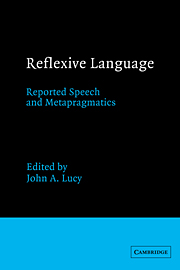Book contents
- Frontmatter
- Contents
- Acknowledgments
- General introduction
- Part I Theoretical foundations
- Part II The relation of form and function in reflexive language
- Part III Text, context, and the cultural functions of reflexive language
- Part IV Interpretation, reported speech, and metapragmatics in the Western tradition
- Introduction to Part IV
- 11 Text, transference, and indexicality
- 12 The importance of reflexive language in George H. Mead's theory of self and communication
- 13 Where epistemology, style, and grammar meet literary history: the development of represented speech and thought
- 14 Metalanguages and subjectivities
- 15 Re-creating Genesis: the metapragmatics of divine speech
- Name index
- Subject index
15 - Re-creating Genesis: the metapragmatics of divine speech
from Part IV - Interpretation, reported speech, and metapragmatics in the Western tradition
Published online by Cambridge University Press: 22 January 2010
- Frontmatter
- Contents
- Acknowledgments
- General introduction
- Part I Theoretical foundations
- Part II The relation of form and function in reflexive language
- Part III Text, context, and the cultural functions of reflexive language
- Part IV Interpretation, reported speech, and metapragmatics in the Western tradition
- Introduction to Part IV
- 11 Text, transference, and indexicality
- 12 The importance of reflexive language in George H. Mead's theory of self and communication
- 13 Where epistemology, style, and grammar meet literary history: the development of represented speech and thought
- 14 Metalanguages and subjectivities
- 15 Re-creating Genesis: the metapragmatics of divine speech
- Name index
- Subject index
Summary
Rabbinic Judaism and early Christianity are both exegetical religions, founded on intricate systems of Scriptural interpretation. Scholars trying to write histories of Christian and Jewish exegesis tend to enter into the process instead of trying to explain its underlying motivations and dynamics. Part of the problem is that the process of interpretation is itself complex; it is a process of using language to understand, define, and make explicit the language of the text. Textual interpretations, as the exegetes themselves are aware, can range from defining obscure words to reading an entire text as allegory. Interpretation, therefore, is “metalinguistic.” Metalinguistic usages, simply put, are uses of words to talk about, explain, define, etc. other words. Such metalinguistic activities depend crucially on the interpreter's ideology of language. Therefore, this investigation into Jewish and Christian exegetical systems begins with the linguistic ideologies of the exegetes, that is, with the ideas the exegetes have about language and the manner in which words function.
To further complicate matters, sacred texts are used as well as read. They are ritual objects, powerful in a manner which must in turn be related to the manner in which they are interpreted. The ritual functions of these texts demand further refinement of our investigation of linguistic ideologies.
- Type
- Chapter
- Information
- Reflexive LanguageReported Speech and Metapragmatics, pp. 393 - 405Publisher: Cambridge University PressPrint publication year: 1993
- 3
- Cited by



